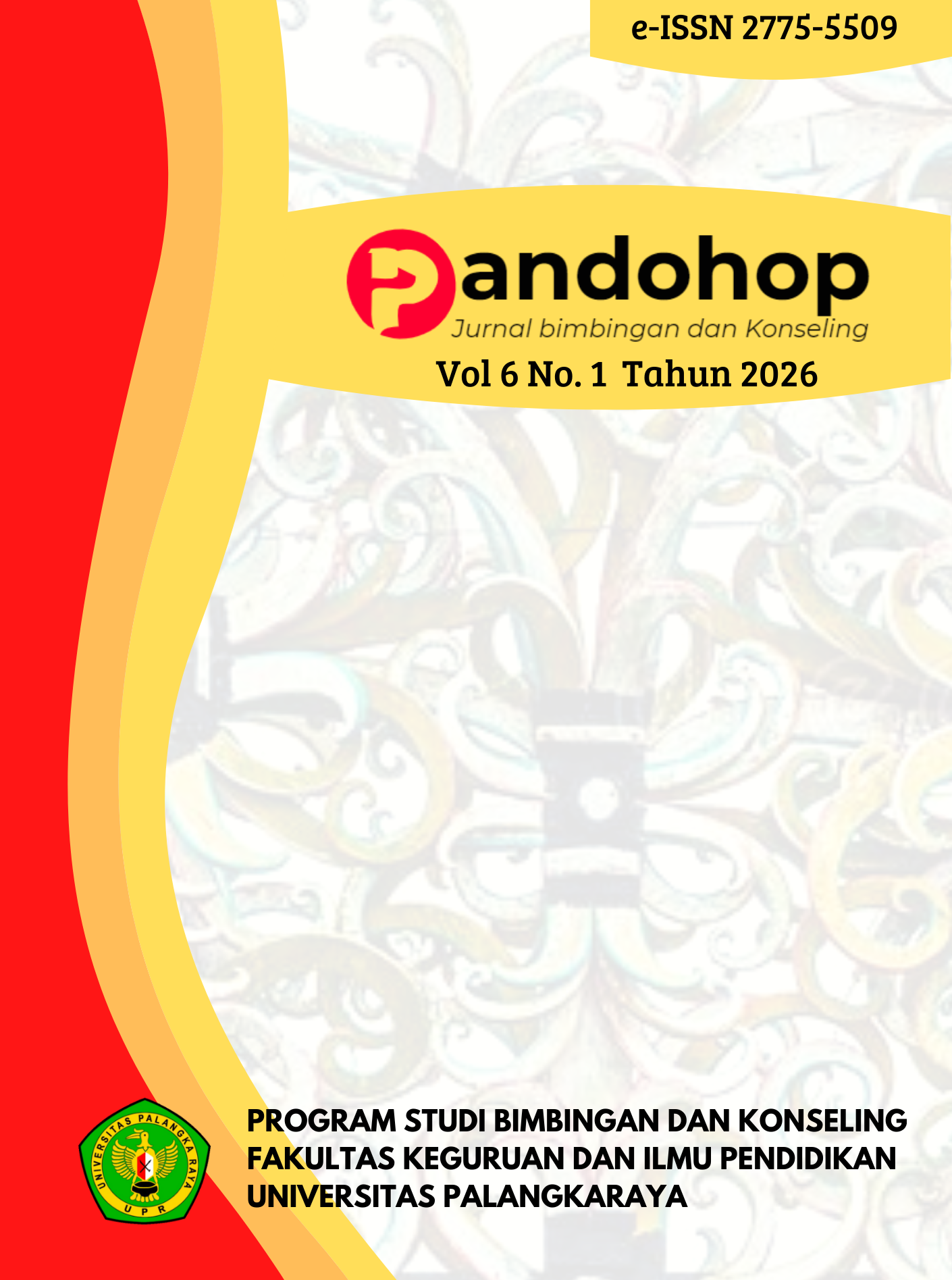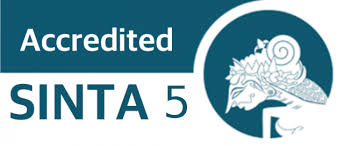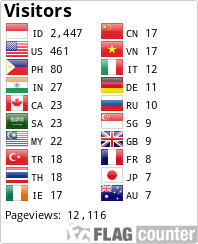Pendidikan Kedamaian sebagai Fondasi Konseling Karier: Studi Literatur tentang Etika Konselor dan Pengambilan Keputusan Siswa
DOI:
https://doi.org/10.37304/pandohop.v6i1.23075Kata Kunci:
konseling, keputusan karir, Pendidikan, konselor, siswaAbstrak
Pendidikan kedamaian tidak hanya berfungsi sebagai wacana normatif, tetapi juga dapat menjadi fondasi praktis dalam layanan konseling karier di sekolah. Penelitian ini bertujuan menelaah keterkaitan antara paradigma pendidikan kedamaian, etika konselor, dan kemampuan pengambilan keputusan karier siswa. Metode yang digunakan ialah studi literatur dengan sumber data berupa artikel penelitian dan ulasan pustaka yang relevan. Analisis isi (content analysis) diterapkan untuk mengidentifikasi peran nilai-nilai kedamaian dalam memandu praktik etis konselor serta kontribusinya terhadap kesiapan siswa dalam menentukan arah karier. Hasil kajian menunjukkan bahwa pendidikan kedamaian memperkuat etika konselor dengan menekankan sikap empati, penghormatan terhadap martabat individu, serta orientasi pada kesejahteraan jangka panjang siswa. Integrasi paradigma ini menjadikan konseling karier lebih humanis, reflektif, dan berkelanjutan. Penelitian ini menegaskan urgensi pengembangan konseling karier berbasis pendidikan kedamaian sekaligus membuka peluang bagi riset lanjutan yang mengintegrasikannya dengan model konseling di sekolah.
Unduhan
Referensi
Abuelaish, I., Goodstadt, M. S., & Mouhaffel, R. (2020). Interdependence between health and peace: a call for a new paradigm. Health Promotion International, 35(6), 1590–1600. https://doi.org/https://doi.org/10.1093/heapro/daaa023
Alhadi, S., Nurani, W., Fauziah, M., & Saputra, W. N. E. (2019). Pelatihan implementasi program pendidikan kedamaian di sekolah menengah kejuruan Muhammadiyah Berbah Kabupaten Sleman. Prosiding Seminar Nasional Hasil Pengabdian Kepada Masyarakat Universitas Ahmad Dahlan, 1(1), 649–656.
Aminurrohim, A. W., Saraswati, S., & Kurniawan, K. (2014). Survei faktor-faktor penghambat perencanaan karier siswa. Indonesian Journal of Guidance and Counseling: Theory and Application, 3(2), 57–63. https://doi.org/https://doi.org/10.15294/ijgc.v3i2.3771
Anand, S. (2014). The contemporary issues and significance of peace education in India. International Journal of Research in Humanities, Arts and Literature, 2(10), 47–54.
Ariyani, E. (2014). Pengaruh internal locus of control terhadap kematangan karier siswa madrasah aliyah negeri 2 samarinda. Motivasi, 2(1), 55–93.
Bikos, L. H., Dykhouse, E. C., Boutin, S. K., Gowen, M. J., & Rodney, H. E. (2013). Practice and research in career counseling and development—2012. The Career Development Quarterly, 61(4), 290–329.
Bilqis, F., Karina, T., & Latipah, I. C. (2019). Peran konselor dalam mewujudkan sekolah aman dan damai bagi siswa. TERAPUTIK: Jurnal Bimbingan Dan Konseling, 2(3), 115–122.
Cegarra-Sánchez, J., Cegarra-Navarro, J. G., & Sánchez-Medina, A. J. (2023). Co-creating practical wisdom through rational, spiritual and emotional capacities. Kybernetes, 52(11), 4937–4957.
Çerkez, Y., Manyeruke, G., Oduwaye, O., & Shimave, S. (2018). Ethical issues in counseling: a trend analysis. Quality & Quantity, 52(1), 223–233. https://doi.org/https://doi.org/10.1007/s11135-017-0604-6
Chubbuck, S. M., & Zembylas, M. (2011). Toward a critical pedagogy for nonviolence in urban school contexts. Journal of Peace Education, 8(3), 259–275. https://doi.org/10.1080/17400201.2011.621362
Cingel Bodinet, J. (2016). Pedagogies of the futures: Shifting the educational paradigms. European Journal of Futures Research, 4(1), 1–11. https://doi.org/10.1007/s40309-016-0106-0
Cunliffe, R. H. (2017). Conflict resolution classrooms to careers: an emergent theory of change with implications for a strategy in peace education. Journal of Peace Education, 14(2), 235–252. https://doi.org/10.1080/17400201.2016.1278165
David, D., Ştefan, S., & Terracciano, A. (2019). Cognitive-behavioral therapy in the cross-cultural context: an extension of the standard paradigm from individual to country/culture level—a brief introduction into a new research line. Journal of Rational-Emotive & Cognitive-Behavior Therapy, 37(2), 172–184. https://doi.org/https://doi.org/10.1007/s10942-018-0303-9
Dempsey, R. P., Eskander, E. E., & Dubljević, V. (2023). Ethical decision-making in law enforcement: A scoping review. Psych, 5(2), 576–601.
Ekpoh, U. I. (2015). Assessing the institutionalization of peace education and peace culture at post primary school level in Calabar education zone, Cross River State, Nigeria. International Journal of Education and Research, 3(7), 175–182.
Fadli, R. P., Alizamar, A., & Afdal, A. (2017). Persepsi siswa tentang kesesuaian perencanaan arah karier berdasarkan pilihan keahlian siswa sekolah menengah kejuruan. Konselor, 6(2), 74–82. https://doi.org/https://doi.org/10.24036/02017627578-0-00
Fernandez, E., Salem, D., Swift, J. K., & Ramtahal, N. (2015). Meta-analysis of dropout from cognitive behavioral therapy: Magnitude, timing, and moderators. Journal of Consulting and Clinical Psychology, 83(6), 1108.
Griffith, C., Mariani, M., McMahon, H. G., Zyromski, B., & Greenspan, S. B. (2019). School counseling intervention research: A 10-year content analysis of ASCA-and ACA-affiliated journals. Professional School Counseling, 23(1), 1–12. https://doi.org/https://doi.org/10.1177/2156759X19878700
Habsy, B. A., & Kurniawan, N. A. (2022). Human Character Based on Ki Ageng Suryomentaram Teachings and Its Implementation in Guidance and Counseling Services. Jurnal Kajian Bimbingan Dan Konseling, 7(3).
Harrell, S. P. (2015). Culture, wellness, and world “PEaCE”: An introduction to person-environment-and-culture-emergence theory. Community Psychology in Global Perspective, 1(1), 16–49.
Harris*, I. M. (2004). Peace education theory. Journal of Peace Education, 1(1), 5–20. https://doi.org/https://doi.org/10.1080/1740020032000178276
Hartung, P. J. (2010). Practice and research in career counseling and development—2009. The Career Development Quarterly, 59(2), 98–142.
Hayden, S. C. W., Osborn, D. S., Peace, C., & Lange, R. (2021). Enhancing agency in career development via cognitive information processing theory. British Journal of Guidance & Counselling, 49(2), 304–315.
Iliescu, A. N. (2025). The prevalence of emotionality and spirituality over rationality in knowmads’ career decision making: a qualitative case study on individual knowledge dynamics. International Journal of Markets and Business Systems, 6(1), 24–45.
Jabbour, K. K. (2013). Peace education in the Lebanese curriculum. Anadolu Journal of Educational Sciences International, 3(2), 52–57.
Jeong, J.-G., Choi, S. B., & Kang, S.-W. (2022). Leader’s perception of corporate social responsibility and team members’ psychological well-being: Mediating effects of value congruence climate and pro-social behavior. International Journal of Environmental Research and Public Health, 19(6), 3607.
Kivunja, C. (2014). Do You Want Your Students to Be Job-Ready with 21st Century Skills? Change Pedagogies: A Pedagogical Paradigm Shift from Vygotskyian Social Constructivism to Critical Thinking, Problem Solving and Siemens’ Digital Connectivism. International Journal of Higher Education, 3(3), 81–91. https://doi.org/10.5430/ijhe.v3n3p81
Kurniawan, N. A. (2020). Guidance and Counseling Problems in Indonesia: A Critical Review. 6th International Conference on Education and Technology (ICET 2020), 255–258. https://doi.org/https://doi.org/10.2991/assehr.k.201204.048
Kurniawan, N. A. (2024). Pengembangan model konseling harmoni untuk meningkatkan keterampilan pengambilan keputusan karier siswa Sekolah Menengah Kejuruan (SMK). Universitas Negeri Malang.
Kurniawan, N. A., Hidayah, N., Akbar, S., Ramli, M., Ngussa, B. M., Fitriyah, F. K., & Hanafi, H. (2024). Exploring Postponing Career Decisions of Indonesian Vocational Students from Biopsychososial Dimension: A Path Analysis. South Eastern European Journal of Public Health, SE-Articles, 375–385. https://doi.org/10.70135/seejph.vi.863
Kurniawan, N. A., Hidayah, N., Akbar, S., Ramli, M., Nor, M. B. M., Hanafi, H., & Ralianti, D. D. (2025). A Study of the Acceptability of the Harmony Counselling Model Guideline to Enhance Vocational High School Students’ Career Decision-Making Skills. Ghaidan: Jurnal Bimbingan Konseling Islam Dan Kemasyarakatan, 9(2), 89–102.
Lewsader, J., & Myers-Walls, J. A. (2017). Developmentally appropriate peace education curricula. Journal of Peace Education, 14(1), 1–14. https://doi.org/https://doi.org/10.1080/17400201.2016.1228527
Linda, H. S. (2017). Hubungan Antara Konsep Diri Akademik Dan Keraguan Mengambil Keputusan Karier Dengan Kematangan Karier Pada Siswa Kelas XII SMK Negeri 3 Kota Salatiga. Jurnal Psikohumanika, 9(1), 62–79. https://doi.org/https://doi.org/10.31001/j.psi.v9i1.335
Liu, Y., Cochrane, W. S., Fox, D., & Sanetti, L. M. H. (2020). Treatment Integrity of Intervention Studies in Professional School Counseling From 1997 to 2018: A Systematic Review. Professional School Counseling, 23(1), 1–9. https://doi.org/https://doi.org/10.1177/2156759X20907068
Mardiyati, B. D., & Yuniawati, R. (2015). Perbedaan adaptabilitas karier ditinjau dari jenis sekolah (SMA dan SMK). Empaty: Jurnal Fakultas Psikolog, 3(1), 31–41.
McMillan, J. H., & Schumacher, S. (2010). Research in education: Evidence-based inquiry. pearson.
Morales, E. (2021). Peace Education and Colombia’s Efforts Against Violence: A Literature Review of Cátedra de la Paz. Revista Latinoamericana de Estudios Educativos (México), 51(2), 13–42. https://doi.org/https://doi.org/10.48102/rlee.2021.51.2.384
Munbaits, S., Umaroh, S. K., & Ramadhan, Y. A. (2023). Pengaruh Efikasi Diri Pengambilan Keputusan Karier Terhadap Career Indecision Mahasiswa Di Samarinda. MOTIVASI, 9(1), 33–39.
Nasution, M. K. M. (2017). Penelaahan literatur. Teknik Penulisan Karya Ilmiah, 3.
Navarro-Castro, L., & Nario-Galace, J. (2010). Peace education: A pathway to the culture of peace. https://doi.org/https://doi.org/10.29210/30031494000
Newman, C. F. (2010). Competency in conducting cognitive–behavioral therapy: Foundational, functional, and supervisory aspects. Psychotherapy: Theory, Research, Practice, Training, 47(1), 12. https://doi.org/https://doi.org/10.1037/a0018849
Nikmarijal, N., Janawi, J., Wahyudi, W., & Komariah, K. (2022). Pengaruh skill abad 21 terhadap keputusan karier siswa sekolah menengah kerjuruan. JRTI (Jurnal Riset Tindakan Indonesia), 7(1), 48–51. https://doi.org/https://doi.org/10.29210/30031494000
Ofojebe, F. (2014). Integrating peace education into the Nigerian basic education curriculum for a lasting peace and environmental sustainability. European Scientific Journal, 10(34).
Otu, M. S. (2024). Effect of purpose-based career coaching on career decision-making. Current Psychology, 43(31), 25568–25594.
Permata, M. M., Tiatri, S., & Mularsih, H. (2018). Peran parental career specific behavior dan trait kepribadian terhadap perilaku eksplorasi karier siswa sma kelas xi (studi pada sekolah x di jakarta barat). Jurnal Muara Ilmu Sosial, Humaniora, Dan Seni, 2(2), 671–680. https://doi.org/10.24912/jmishumsen.v2i2.2221
Prahesty, I. D. (2013). Perbedaan kematangan karier siswa ditinjau dari jenis sekolah. Character: Jurnal Penelitian Psikologi., 2(1), 1–7.
Prasetyo, G., Joebagio, H., &
Yamtinah, S. (2019). Modern Paradigm: Democratic Skills in a Higher Order Thinking Skills Frame. Budapest International Research and Critics Institute-Journal (BIRCI-Journal), 150–159. https://doi.org/: https://doi.org/10.33258/birci.v2i4.471
Rahmi, F., & Puspasari, D. (2017). Kematangan karier ditinjau dari jenis kelamin dan jenis sekolah di kota padang. Jurnal RAP (Riset Aktual Psikologi Universitas Negeri Padang), 8(1), 24–35. https://doi.org/https://doi.org/10.24036/rapun.v8i1.7949
Rogers, C. R., & Carmichael, L. (1942). Counseling and psychotherapy: Newer concepts in practice. Boston Houghton Mifflin.
Saputra, W. N. E. (2016). Pendidikan Kedamaian: Peluang Penerapan Pada Pendidikan Tingkat Dasar Di Indonesia. Jurnal CARE (Children Advisory Research and Education), 3(3), 88–94.
Saputra, W. N. E., Supriyanto, A., Astuti, B., Ayriza, Y., Adiputra, S., & Da Costa, A. (2020). Peace counseling approach (PCA) to reduce negative aggressive behavior of students. Universal Journal of Educational Research, 8(2), 631–637.
Scott, D., & Usher, R. (1996). Understanding educational research. Routledge London.
Setiawati, S. (2021). Profil Keputusan Karier Siswa SMK. IJoCE: Indonesian Journal of Counseling and Education, 2(1), 23–30.
Shin, Y., & Lee, J. (2018). Predictors of career decision self-efficacy: Sex, socioeconomic status (SES), classism, modern sexism, and locus of control. Journal of Career Assessment, 26(2), 322–337.
Sokal, L., Trudel, L. E., & Babb, J. (2020). Canadian teachers’ attitudes toward change, efficacy, and burnout during the COVID-19 pandemic. International Journal of Educational Research Open, 1, 100016. https://doi.org/https://doi.org/10.1016/j.ijedro.2020.100016
Teeroovengadum, V., Kamalanabhan, T. J., & Seebaluck, A. K. (2012). Towards a Holistic and Transformative Approach to Education: The Emergence of a New Paradigm in Education. International Journal of Learning, 18(9).
Trilling, B., & Fadel, C. (2009). 21st century skills: Learning for life in our times. John Wiley & Sons. https://doi.org/http://dx.doi.org/10.14507/er.v0.1296
Umar, M. (2017). Internalisasi Nilai Kedamaian melalui Pendidikan Kedamaian sebagai Penguatan Pembangunan Karakter pada Masyarakat Heterogen. Waskita: Jurnal Pendidikan Nilai Dan Pembangunan Karakter, 1(1), 77–98. https://doi.org/https://doi.org/10.21776/ub.waskita.2017.001.01.5
Velez, G. M., & Gerstein, L. H. (2021). Supporting peaceful individuals, groups, and societies: Peace psychology and peace education. Peace and Conflict: Journal of Peace Psychology, 27(2), 103.
Wahyudin, D. (2018). Peace education curriculum in the context of Education Sustainable Development (ESD). Journal of Sustainable Development Education and Research, 2(1), 21–32.
Wang, D., Liu, X., & Deng, H. (2022). The perspectives of social cognitive career theory approach in current times. Frontiers in Psychology, 13, 1023994.
Yablon, Y. B. (2007). Cognitive rather than emotional modification in peace education programs: Advantages and limitations. Journal of Moral Education, 36(1), 51–65. https://doi.org/https://doi.org/10.1080/03057240601185463
Zembylas, M. (2018). Con-/divergences between postcolonial and critical peace education: Towards pedagogies of decolonization in peace education. Journal of Peace Education, 15(1), 1–23. https://doi.org/https://doi.org/10.1080/17400201.2017.1412299
Zucchini, D. (2025). Vocational Guidance 5.0: an Instrument for Peace Education: Towards an Integrated Vision of Work, Social Responsibility, and Sustainable Development. UPPADO, 57.
Unduhan
Diterbitkan
Cara Mengutip
Terbitan
Bagian
Lisensi
Hak Cipta (c) 2026 Nanda Alfan Kurniawan, Destanika Dhiffa Ralianti, Husni Hanafi, Wahyu Widyatmoko, Parid Rilo Pambudi

Artikel ini berlisensi Creative Commons Attribution 4.0 International License.









